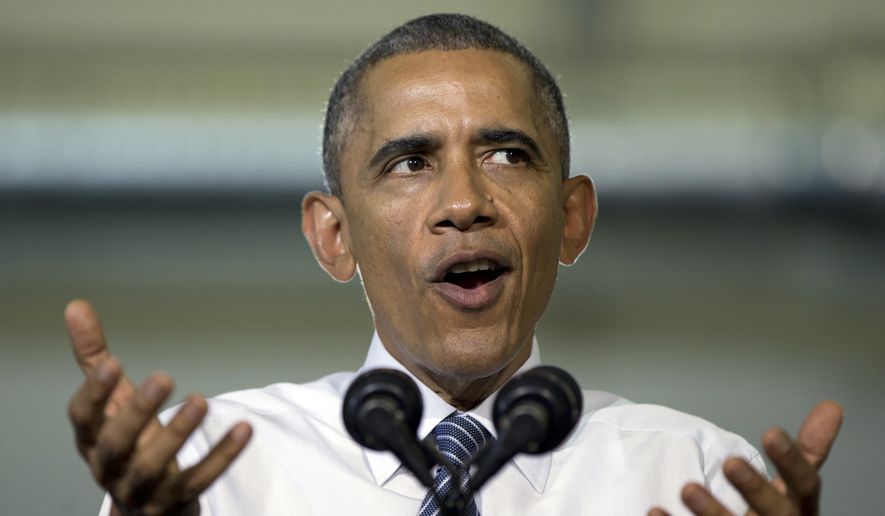President Obama’s budget proposal for fiscal 2016 might give you the impression that the federal government isn’t $18 trillion in debt.
Mr. Obama called Monday for a nearly 7-percent increase in spending and big tax increases, saying the U.S. can afford to toss aside automatic spending caps because the annual budget deficit has fallen to a mere $468 billion, the lowest of his presidency.
It’s true that the government’s red ink has declined by about two-thirds since the string of trillion-dollar deficits that Mr. Obama and Congress racked up during his first term. But the president isn’t talking much about the soaring national debt, or the rapidly rising interest payments that will crowd out other budget priorities over the next decade.
The total federal debt hit $18 trillion in December. When Mr. Obama took office in January 2009, total debt stood at $10.6 trillion. That’s an increase of about 70 percent in six years.
By the time Mr. Obama leaves office, the total debt is projected to rise to about $20.1 trillion.
Given that burden on taxpayers, Mr. Obama’s spending plan is “utterly irresponsible,” said Michael Tanner, a senior fellow at the libertarian Cato Institute.
SEE ALSO: Obama calls for additional funding for veterans
“It’s as if a family is way in over their heads with credit cards maxed out, and they get a small bonus at work, and rather than pay off any of that debt, they go on vacation,” Mr. Tanner said. “We’re all patting ourselves on the back because the deficit’s down. That still means we’re borrowing about 15 cents out of every dollar we spend.”
While deficits have declined, analysts and the non-partisan Congressional Budget Office say the current budget picture is about as good as it will get, with the costs of entitlement programs still growing unchecked. CBO is projecting the annual budget deficit to bottom out in fiscal 2016 at $467 billion, and to rise rapidly after that, topping $1 trillion again by 2025.
The forecast of rising deficits, and debt, doesn’t take into account Mr. Obama’s budget proposal. Budget analysts say the debt crisis would only accelerate if Congress approved his spending blueprint.
“Under these policies, the national debt remains high and will grow significantly in the long run, when rising interest and mandatory spending obligations threaten to crowd out important investments,” said Michael Peterson, president of the nonprofit Peter G. Peterson Foundation. “In his budget, interest alone is $5.6 trillion over just ten years, and will increase rapidly thereafter.”
Senior administration officials said the budget deficit will fall in fiscal 2016 to 2.5 percent of gross domestic product, which is a manageable level by historical standards. Office of Management and Budget Director Shaun Donovan said if all of Mr. Obama’s proposals are approved, including large tax increases on corporations and wealthier families, the national debt would actually decline over the next decade as a share of economic output, from 75 percent in fiscal 2016 to 73.3 percent in 2025. On the current course, it would rise to 81 percent of GDP in 2025.
Mr. Donovan also said the nation’s long-term debt would be eased if Congress approves comprehensive immigration reform, which would bring more workers into the system to pay Social Security taxes.
SEE ALSO: Obama budget would let D.C. marijuana legalization, sales proceed
“Comprehensive immigration reform is actually one of the most critical things that we can do to shore up the long-term solvency of Social Security and as a result, to improve our deficit challenges in the long run,” Mr. Donovan said.
As the debt rises, the administration’s own projections show how it will sap taxpayer dollars that could otherwise pay for defense, health care, education or other priorities. Interest payments on the debt will double in just the next five years, from $266.7 billion currently to $578.3 billion in 2020.
Senate Budget Chairman Jeff Sessions, Alabama Republican, noted that the administration’s forecast shows interest payments rising to $785 billion per year by 2025.
“That’s almost 20 times what we spend right now on the highway budget,” Mr. Sessions said. “Within six years, our annual interest payment will exceed the defense budget.”
While many GOP lawmakers are anxious to eliminate caps on defense spending, Republicans said the president’s overall budget is a non-starter.
House Majority Leader Kevin McCarthy, California Republican, said Mr. Obama’s spending blueprint “simply isn’t a serious proposal.”
“While Washington is still racking up debt, this budget doesn’t even try to balance the books,” Mr. McCarthy said. “Despite the best efforts of Republicans over the past four years to rein in spending and cut the deficit, this budget would erase all those gains over the ten year budget horizon by increasing the deficit and adding even more to the debt. Our children and grandchildren can’t afford such recklessness.”
Pete Sepp, president of the National Taxpayers Union, said he’s concerned that some GOP lawmakers will go along with the president’s proposal to eliminate spending caps.
“For the first time since the Korean War, discretionary spending actually fell over a two-year period. And now we want to throw that away,” Mr. Sepp said. “Here’s where the Republicans have a great deal of responsibility. If they fall for the bait-and-switch of taking more defense spending in exchange for more domestic spending, they will be endangering all the principles they stand for as well as their political position.”
• Dave Boyer can be reached at dboyer@washingtontimes.com.




Please read our comment policy before commenting.